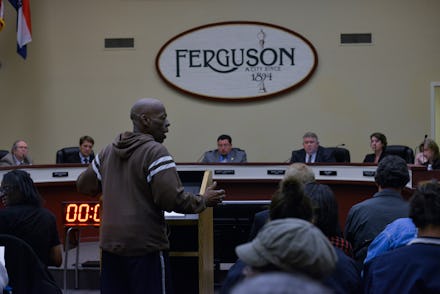In Ferguson, One Vote Exposes the City's Bitter Racial Divide

In the wake of the fatal shooting of Michael Brown in August of 2014 at the hands of white police officer Darren Wilson, Ferguson, Missouri, became the epicenter of protests against police brutality. As racial tension fomented into unrest and turmoil, debates over how to mend the city's broken systems of government raged, never yielding clean-cut solutions.
But the results of a city council vote on Jan. 26 proved that sometimes, there is no grey area: Things really can be a matter of black and white.
According to the St. Louis Post-Dispatch, earlier this month Councilman Brian P. Fletcher, a white man, died of a heart attack, prompting the remaining five council members to appoint someone to the sixth seat. Council members moved to nominate white Ferguson-Florissant School Board member Rob Chabot, and a black woman named Laverne Mitchom, who participated in a number of Ferguson protests.
The vote fell perfectly along race lines: The two white council members voted for Chabot, whereas the three black council members moved to elect Mitchom.
It seemed like the 3-2 vote in favor of Mitchom should have been a case of majority rule, but at a meeting on Jan. 26, Ferguson City Attorney Stephanie Karr reportedly told the audience present that the position requires a nominee to receive at least four votes to be seated, according to the Post-Dispatch.
"I really hope the council and the community members challenge this," Ferguson Democratic Committeewoman Patricia Bynes told Mic. "I can't even call Karr's decision an interpretation of the law because the city charter says 'majority.'" The Post-Dispatch reported that the charter in fact does not require four votes for an election.
Karr, in her capacity as Ferguson's prosecutor, is among the city officials who have maintained the status quo, according to Bynes, who claimed Karr's decision was an abuse of power. "The fact that she's still on board and pursuing these cases has made people very leery in believing there's going to be any substantial change from the city with her in place," said Bynes.
Mic reached out to Karr, who declined to comment. The City of Ferguson's Media Relations Coordinator also declined Mic's requests to interview council members and Mayor James Knowles.
In Bynes' eyes, the contentious council vote goes beyond Karr, and it even goes beyond race, though she emphasized that race isn't a factor to be dismissed. "There is a racial problem that exists in communities all across this country and Ferguson is the perfect case study, the perfect storm, of what happens when all of this bubbles to the surface at once," she said.
Bynes added, though, that the battle is really between those who want to see change in the city and those who don't, black or white.
According to Ferguson's charter, if no council member is elected in 30 days, it will be up to the mayor to appoint someone.
"I'm just hoping this motivates the community to get organized and involved," Bynes said. "You can't fall asleep at the wheel because they're pulling tricks at every turn."